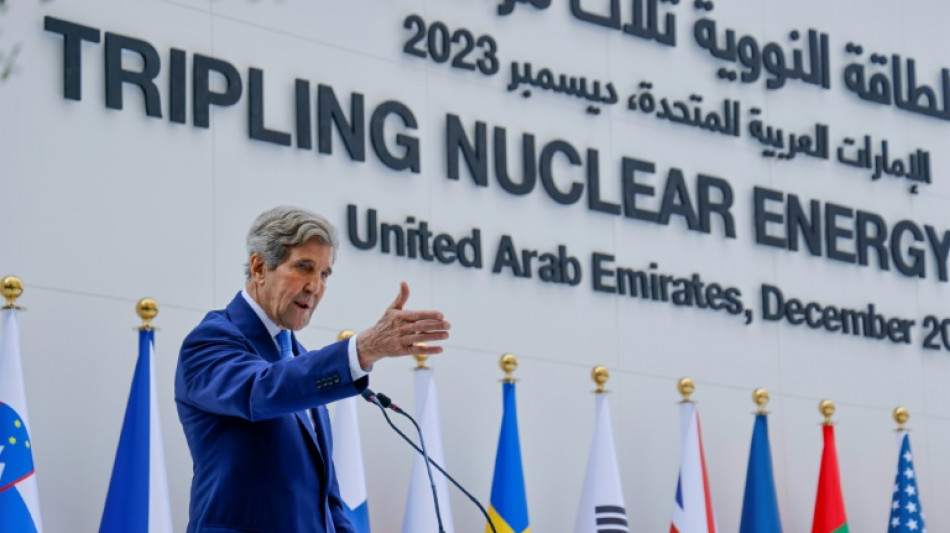
US leads call to triple nuclear power at COP28

More than 20 nations including the United States called for a tripling of nuclear energy to drive down emissions on Saturday as world leaders assembled for a second day at UN climate talks in Dubai.
With smoggy skies in Dubai highlighting the challenges facing the world, other pledges are expected at the COP28 conference, including stepping up the deployment of renewable energy and cutting methane emissions.
The use of nuclear power as a cleaner alternative to fossil fuels is highly controversial as environmental groups are concerned about safety and the disposal of nuclear waste.
But more than 20 nations ranging from the US to Ghana, Japan and several European countries said in a declaration that it plays a "key role" in the global goal of achieving carbon neutrality by mid-century.
They called for the tripling of nuclear energy capacity by 2050 from 2020 levels.
"We are not making the argument to anybody that this is absolutely going to be a sweeping alternative to every other energy source," US climate envoy John Kerry said at the COP28 conference in Dubai.
"But we know because the science and the reality of facts and evidence tell us that you can't get to net zero 2050 without some nuclear," he said.
The other signatories include Britain, France, South Korea, Ukraine and the United Arab Emirates, but nuclear powers Russia and China did not sign up.
Environmental group 350.org said the Fukushima nuclear disaster in 2011 in Japan highlighted the dangers of atomic power.
"While we appreciate that the Biden administration is looking to invest in alternatives to fossil fuels, we don't have time to waste on dangerous distractions like nuclear energy," said its North American director Jeff Ordower.
- Methane 'most destructive' -
The declaration came as more world leaders took the stage at COP28 for the second day in a row, though US President Joe Biden and Chinese leader Xi Jinping are skipping the talks.
"We want to make the energy transition a global success story. It has to be now," German Chancellor Olaf Scholz said.
"We all have to demonstrate the same determination to phase out fossil fuels, beginning with coal," he said.
Nations at the COP28 talks are also expected to adopt a goal of tripling renewable energy and doubling energy efficiency by 2030.
The European Union first appealed for the new targets earlier this year, and the cause has since been taken up by COP28 hosts the UAE, then the G7 and G20 groups of nations.
The discussions about the renewables goal are closely linked to far more difficult negotiations about whether a final COP28 deal will commit nations to phasing down -- or phasing out -- all fossil fuels.
The United States and China, the world's two biggest emitters of greenhouse gases, and the UAE will host later Saturday a summit on methane emissions.
Methane, a non-CO2 gas, is the second largest contributor to climate change, accounting for around 16 percent of the warming effect.
China agreed for the first time to include all greenhouse gases in its next national climate pledge for 2035 in an agreement with the US last month.
But Beijing has stopped short of joining a US-backed Global Methane Pledge that has been signed by more than 150 countries and seeks to reduce global methane emissions by at least 30 percent from 2020 levels by 2030.
Methane "is the most destructive gas", Kerry said.
F. Dumont--BTZ

 London
London

 Manchester
Manchester
 Glasgow
Glasgow
 Dublin
Dublin
 Belfast
Belfast
 Washington
Washington
 Denver
Denver
 Atlanta
Atlanta
 Dallas
Dallas
 Houston Texas
Houston Texas
 New Orleans
New Orleans
 El Paso
El Paso
 Phoenix
Phoenix
 Los Angeles
Los Angeles



